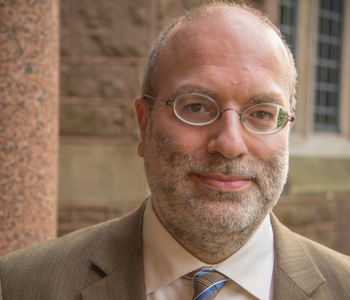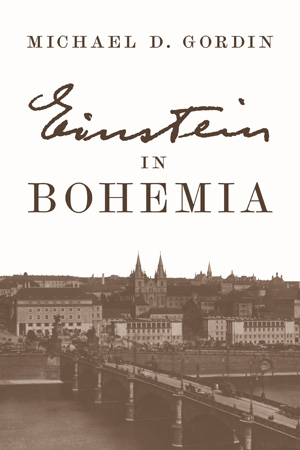
The point of departure for Einstein in Bohemia is a simple observation: for about sixteen months, from April 1911 to August 1912, Albert Einstein (1879-1955) was professor of theoretical physics in Prague. Everyone has heard of Einstein, and he has attracted more than his fair share of biographers, all of whom mention his time in the capital of Bohemia. For the most part, though, all you get is a mention. Prague was a “sojourn,” an “intermezzo,” a “way station.”
Suppose that’s wrong. True, Einstein was only there for less than a year and a half, but he didn’t know that when he arrived from Zurich; he had been planning on settling down into his new position. We might judge with the benefit of hindsight that he was only there for an intermezzo, but in April 1911 Einstein thought he was settling in for the full opera.
So let’s take the Prague period the way Einstein did when he lived it: seriously. You might try to trace, in micro-historical fashion, Einstein’s every day as he trotted between his apartment and his office. Even for a scientist as well documented as Einstein—and there is probably no other figure in the history of science, with the possible exception of Charles Darwin, who can compare in terms of the density of surviving materials—this is not possible, and it would probably be a little dull.
Einstein in Bohemia opts not to narrow the angle, but to widen it. We know a lot about Einstein, but we also know a lot about Prague. It was, at that time, the third largest city in the Austro-Hungarian Empire, a pivotal economic and cultural center, and one experiencing a demographic transition from a roughly balanced city between Czech- and German-speakers to one overwhelmingly the former (93% and 7%, respectively, when Einstein arrived). It was a city with a strong Jewish community and a rich past and future.
Picture a messy collision. An especially interesting individual interacted deeply with an extraordinary place, and then they parted. Both left traces on each other. The first three chapters of the book chronicle the narrow interaction: how Einstein got to Prague, the work on general relativity that he concentrated on while there, and then his daily life until he came to leave. The four remaining chapters explore the aftermath of the collision: how Einstein and Prague marked each other when it came to philosophy of science, literature, Zionism and Judaism, and the intellectual history of the Czechs.
I want the reader to dive in and feel the immersive effect of a culture on a person, and vice versa. Whatever preconceptions you have about Einstein or Prague ought to be jostled by the experience.
There are two fundamental conceptions that animate this book, one drawn from the history of science, and the other from the history of Central Europe.
The first is the principle of not writing Whiggish histories. The goal is not to take the end point for granted and narrate the story as leading up to it. This is merely a logical consequence of a universal truth: nobody knows the future. In the present, you make decisions based on the information available to you right now conditioned by various probabilities, emotions, and circumstances. We should treat historical actors the same way.
Einstein did not know he would only stay in Prague briefly—he planned to stay a while. He did not know that the theory of general relativity he worked on there would have to be discarded and rebuilt when he returned to Zurich—he hoped it would pan out. None of the Prague residents in the book knew that Hitler was coming, that Czechoslovakia’s Jews would be murdered, that the Germans would be expelled after the war, that Communism would come and then go. They lived their lives without knowing that future which we call our past.
With regard to Central European history, Einstein in Bohemia draws on decades of excellent work about the problematic concept of “identity.” People typically take this to be something irreducible, part of who they are: German, Czech, Jewish, for example. The assumption of essential identities has been at the root of a lot of violence in this region over the centuries. I have chosen instead, following sociologist Rogers Brubaker and historian Frederick Cooper, to concentrate on “identification”: how people actively make identities for themselves or others. This works for Einstein (German, Swiss, Jew, American), and it works for everyone else. Prague, as a city that has been torn apart repeatedly on confessional and ethnic lines, is an important setting to explore these ideas.
I came to this topic from three directions. I started out as a historian of the physical sciences in Russia, and the first time I visited Prague I was drawn to the city and its intricate Slavic language. I learned that in 1882 the university in Prague, founded in 1348, was split into a German and a Czech institution. I thought this might be a “natural experiment” to look at the effects of language on science. That project didn’t pan out, but it brought me to Einstein.
The second path is that my previous book, Scientific Babel, explored the rise and fall of “major languages” in science: English, French, German, Latin, Russian (among a few others). I wanted the opportunity to focus on so-called “minor” languages, like Czech. As it happens, following Einstein’s network brought me more German-speakers than Czech-speakers, but the latter are present in the book and their stories are fascinating.
The third path is simple: just about every historian of physics has a secret Einstein project. This is mine.
If you were to flip through the book in a bookstore, you might land somewhere around pages 85-90, or if not there somewhere else in chapter 3: “Anti-Prague.” The chapter as a whole is about Einstein’s daily life in Prague, and follows four different tracks: Einstein’s personal attitudes toward life in the city; the social circle he frequented, the salon of Berta Fanta, and its importance for putting him in contact with many influential figures in Prague’s later history; the deteriorating relationship between the physicist and his wife, which reached a breaking point in this period; and how Einstein negotiated a return to Zurich and eventually left the city. The page range I isolated is related to the first of these.
Einstein complained a lot about Prague. He wrote many letters to friends back in Zurich (and elsewhere), almost all of which denigrate both the city and the Habsburg bureaucrats who ran it. At times the correspondence can be amusing, but mostly it shows someone frustrated that things in his new home are not like Switzerland. The chapter is “anti-Prague” in two senses. First, that Einstein’s feelings toward the city were mostly negative. Second, that he developed his picture of a decaying Prague by contrast with orderly Zurich, which was an “anti-Prague” in the sense that a positron is an anti-electron: almost the same but with the opposite charge.
What were the gripes? Nothing especially shocking if you are familiar with the views of German travelers to the Slavic lands of East Central Europe. The water was bad, and you needed to boil it before drinking. There were bedbugs. Locals didn’t speak German enough or very well. The people were servile, they were “barbarians.” That might sound like strong language, but you should not judge Einstein too severely for it. His was a laundry list identical to other travelers’ complaints, and bedbugs are indeed unpleasant. That they also exist in Switzerland and Germany was not something Einstein noted. He also did not remark that Prague had electric lampposts on the street while Zurich still used kerosene. The contrasts all worked in one direction.
I do not want readers to judge Einstein as priggish and biased. When it came to encountering other cultures, his reaction was a very common one. That’s what I would hope readers took away from this episode: that Einstein was human, and he reacted to the world around him the way many people of his particular background and expectations would have done. Einstein may have been Einstein, but he was also a person.
My basic assumption is that you have heard of Albert Einstein. Most people have. More than that, you can probably even picture him. (A weird thing about this man is that whether the figure in the photo is young or old, people can unerringly identify Einstein.) Perhaps you can approximate a quotation that has been attributed to him. A lot of those are apocryphal or mistakenly assigned to Einstein, but no matter. You come to Einstein in Bohemia with a version of Einstein already there in your mind.
That’s likely less true of Prague. Perhaps you have been there. (If not, you should go when you can. It’s a really interesting place.) But even if you have not, it is a city worth learning about. For roughly a millennium, Prague has been a central node of European culture. Artists of all sorts have flourished there, ranging from baroque painters to opera composers (Mozart wrote Don Giovanni there) to arguably the most canonical author of the twentieth century, Franz Kafka. Although it has been the site of intense and violent conflict—the Hussite wars of religion in the fifteenth century, the Thirty Years’ War in the seventeenth, the Nazi occupation in the late 1930s, the Soviet-led invasion in the late 1960s—it has never been fully destroyed. There are medieval monasteries right next to modernist masterpieces.
What do you get by putting both together? I hope that you end up with a changed picture of both Prague and Einstein.
Prague is often presented as a city of the arts, a city of religion, a city of culture. It certainly was all that, but it has also been for centuries an important city of science. This should not be surprising, since science is part of culture and is nourished by it, but yet the point always seems to take people aback. My goal is that you will think of Prague as a place where knowledge was made, as well as a city that concentrated much of the best and sadly some of the worst of Europe across its long history. Einstein’s collision with Prague illuminates many of those aspects.
Principally, I would like the reader to see a different Einstein, and through him another way of thinking about identification and belonging. For a brief period, Einstein lived in the Austro-Hungarian province of Bohemia. Although he did not realize it at the time, the connections he made there, the thoughts he entertained, followed him throughout his life. Viewing Einstein through the prism of Prague brings certain features of his life into focus—especially his political views and his personality—while situating his science in a community of others.
I want people who read the book to think about what it means to be in a place, and perhaps to reflect on the places they have been, and the mutual impact of those moments.


Michael D. Gordin, a historian of science, is Rosengarten Professor of Modern and Contemporary History and Director of the Society of Fellows in the Liberal Arts at Princeton University. Besides Einstein in Bohemia, featured in his Rorotoko interview, he is the author of five books, including Scientific Babel: How Science Was Done before and After Global English, two books on early nuclear history, a biographical study of Dmitrii Mendeleev, and a history of fringe sciences after World War II.